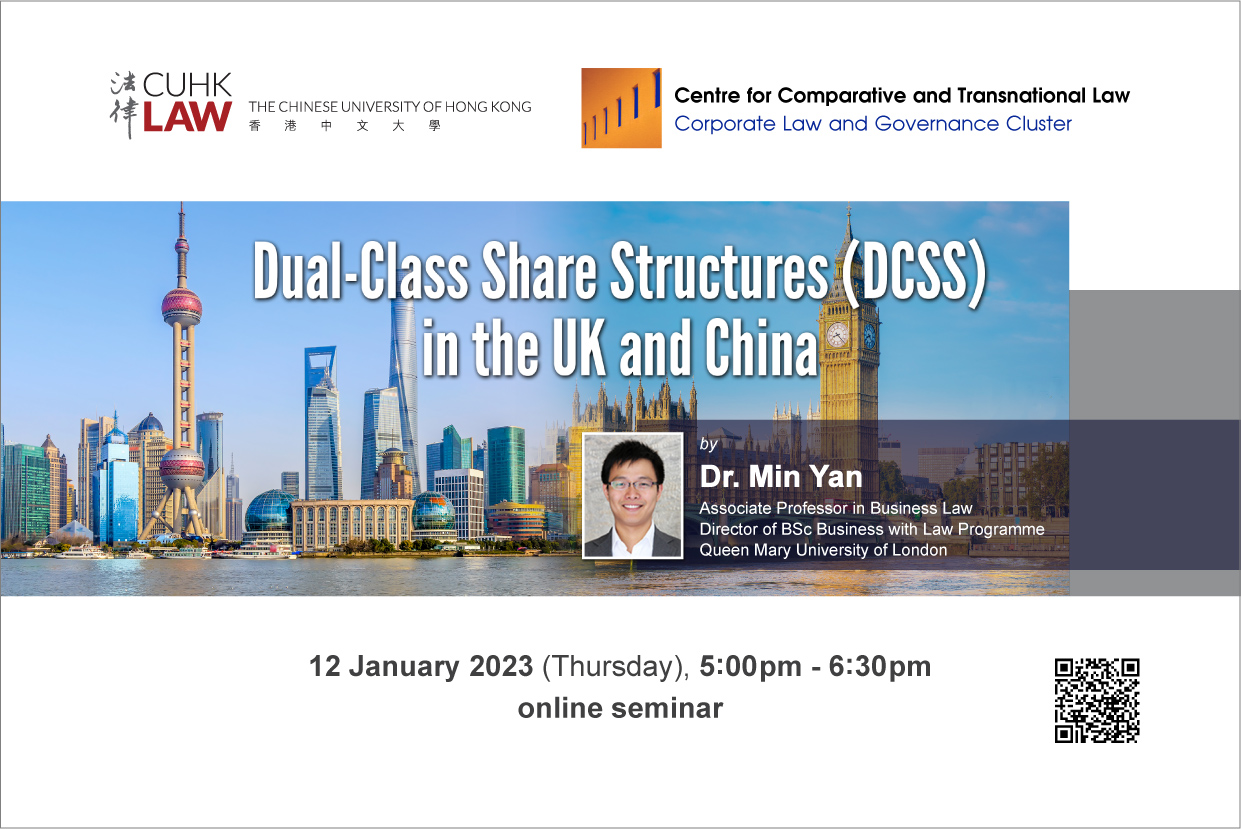Events
CUHK LAW CCTL Corporate Law and Governance Cluster Seminar – ‘Dual-Class Share Structures (DCSS) in the UK and China’ by Dr. Min Yan (Online)
12 Jan 2023
5:00 pm – 6:30 pm
Online via Zoom
Dr. Min Yan is an Associate Professor in Business Law and Director of BSc Business with Law Programme at Queen Mary University of London, and a dual qualified English and Chinese solicitor. His research engages with the intersection between business and law and specialises in corporate law, corporate governance, and corporate responsibility. Dr. Yan has published in leading refereed journals such as Legal Studies, Journal of Corporate Law Studies, Asia Pacific Law Review, Hong Kong Law Journal and well-known U.S. law reviews such as Northwestern Journal of International Law & Business, Delaware Journal of Corporate Law, Hastings Business Law Journal and Columbia Journal of Asian Law. His research has also been featured on the Oxford Business Law Blog, Business Times (Singapore) and Columbia University’s Blog on Corporations and the Capital Markets etc.
cctl.law@cuhk.edu.hk
Unequal voting rights arrangements under dual class share structures are increasingly favoured by entrepreneurs and founders of technology companies, in order to retain a degree of control over the company that is disproportionate to their equity shareholdings. The rise of such share structures around the world has put competitive pressure on both UK and Chinese governments to relax the one share, one vote principle in their stock exchanges to ensure their equities market remains fit for the future development of the economy.
There is, however, a long tradition of institutional investors’ distaste for dual class share structures. For example, the near extinction of dual class listings in the UK capital markets can be largely attributed to the opposition of large British institutions. In this seminar, Dr. Min Yan would first address the conflict between the demands to attract listings from high-tech and innovative companies and concerns of a race to the bottom, and rebut criticisms based on investor protection in the UK context and argue permitting dual class companies to list in the Premium Segment, the higher level of regulatory protection provided in the premium listing regime would help enhance minority shareholder protection and shareholder engagement. The debate in the Chinese context would also be discussed.
When permitting dual class listing, both the UK and China adopt additional safeguarding measures to restrain the potential abuse of controllers’ weighted voting power. Hence, the second main aim of this seminar is to analyze these measures in detail and examine their intended and unintended impact. Dr. Yan would argue mandatory safeguarding measures are a double-edged sword, which not only help mitigate increased governance risks but also undermine the insulation of controllers from external investor and market influence. In other words, too many safeguarding measures would undoubtedly affect the intrinsic value of dual class shares. Thus, what policymakers and regulators should really focus on is how to use this double-edged sword to strike a balance between maintaining a flexible capital structure and controlling the associated governance risks, or perhaps to explore more of the ex post mechanisms, to reduce the reliance on mandatory safeguarding measures as ex ante constraints.
Language: English




